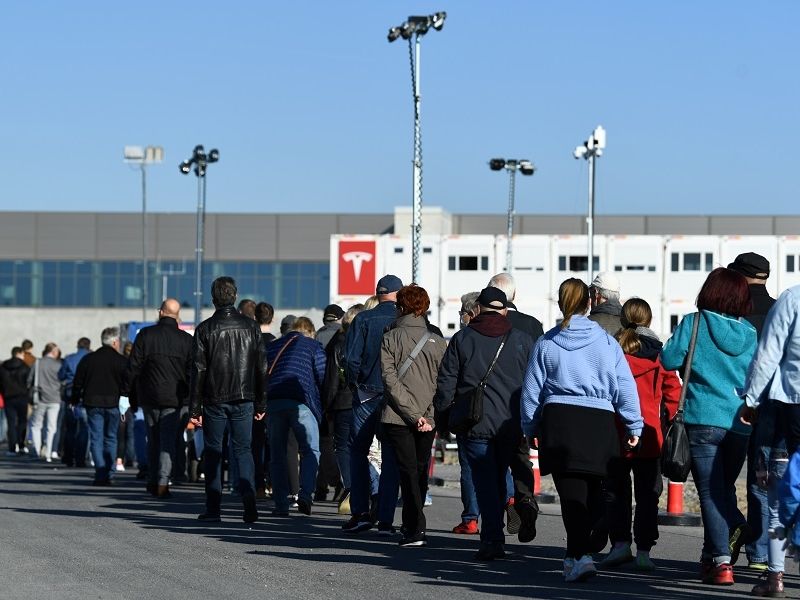
BERLIN — The first cars to emerge from Tesla’s new European factory should roll off the production line as early as next month, but volume production will take longer to achieve, CEO Elon Musk said at a festival held at the site on Saturday.
Production at the plant would amount to about 5,000, “but hopefully” 10,000 vehicles per week, Musk said.
The factory is scheduled to begin making Model Y cars in November or December, Musk said. The plant will probably source batteries from Tesla’s facilities in China until a cell factory in Germany is completed, he said.
“Starting production is nice, but volume production is the hard part,” Musk told a cheering audience at the factory. “It will take longer to reach volume production than it took to build the factory,” Musk said.
He defended the factory against critics of its environmental impact, saying that it used “relatively little” water and that battery cell production was “sustainable.”
Some local residents and environmental groups are unhappy with Musk’s approach, which they say flies in the face of German business culture.
“I would tell him to stop building electrocars but rather fly to Mars,” said Manu Hoyer, who led a small protest of locals who oppose the project on environmental grounds, saying it will pollute drinking water.
Musk is hoping to get approval to start production at the site in coming weeks. At its peak the plant will produce 500,000 full-electric vehicles a year — more than double Germany’s production of full EVs in 2020.
The latest consultation on public concerns towards the site closes on Oct. 14, after which Brandenburg’s Environment Ministry will make a decision. The state’s economy minister has put the chances of the factory gaining approval to operate at 95 percent.
Tesla has submitted plans to invest 5 billion euros ($5.8 billion) in a battery plant with 50 Gigawatt hours capacity next to the car production site, outstripping Volkswagen’s planned 40 GWh capacity at its site in Salzgitter, Germany.
Musk said Tesla was worried that recruiting sufficient staff would be an issue, calling for people to apply from “all over Europe.”
Pop star reception
The company offered 9,000 tickets to the festival, with residents of Brandenburg given priority.
The mood was festive, with photos posted on social media showing visitors lining up for Model Y test rides, a ferris wheel and tours of the factory’s interior.
“Look, Mummy! A Tesla,” shouted an excited 9-year old called Emil, one of many children lined up with parents waiting for a 90-minute site tour.
Fans cheered and laughed when Musk took the stage at sunset, welcoming him like a pop star.
“This day is unique,” said Tesla fan Fred Schroeder. “The Tesla factory in Germany will be opened to the public for the first time. That is a very special day.”
Another had driven his Tesla from Milton Keynes in Britain, despite not having a ticket. He said it was worth it just to see the site from the outside.
In a nod to some of the environmental opposition, Musk said Tesla will plant more trees than it has cut down and make sure the factory uses as little water as possible.
Musk said he aims to introduce more Tesla products in Europe next year, including its solar roof and its so-called Full Self-Driving system. “It’s looking highly likely to be in Europe next year,” he said of FSD.
Tesla has said that while FSD is designed to someday handle trips without driver intervention, it’s not yet capable of rendering Tesla cars autonomous.
The new factory underpins Tesla’s European expansion plans just as Volkswagen, Daimler and BMW broaden their EV lineups. For Germany, the plant promises new jobs in a region that lost most of its heavy industry during World War II.
Bloomberg contributed to this report

